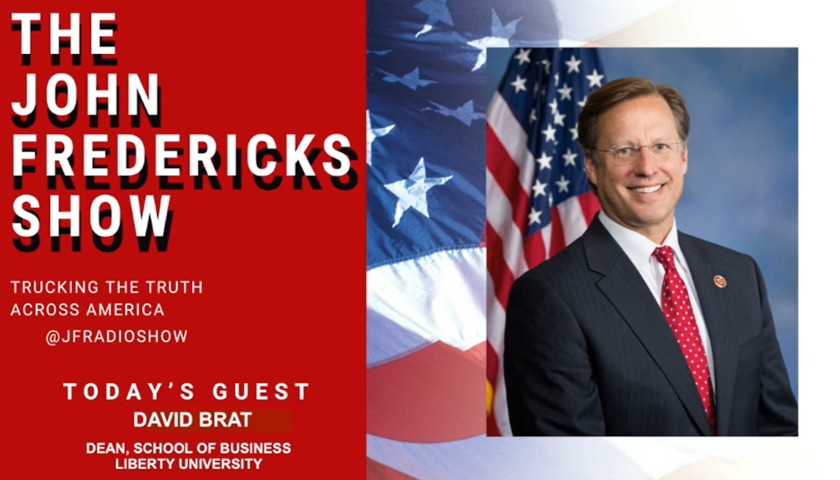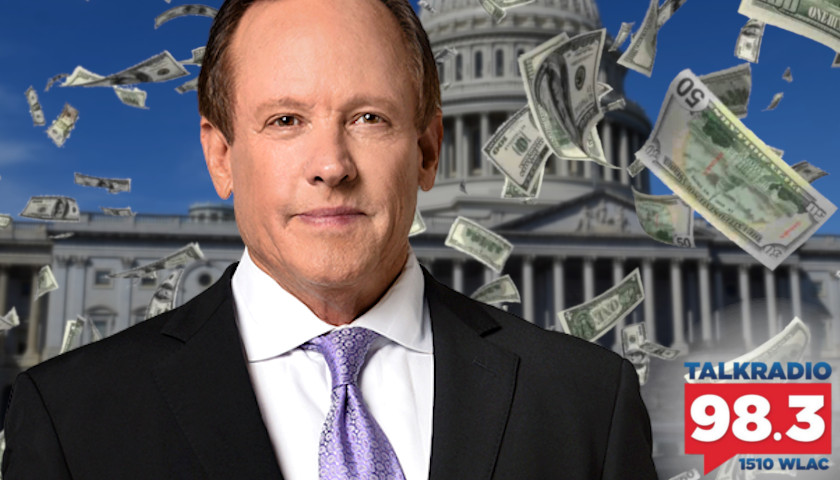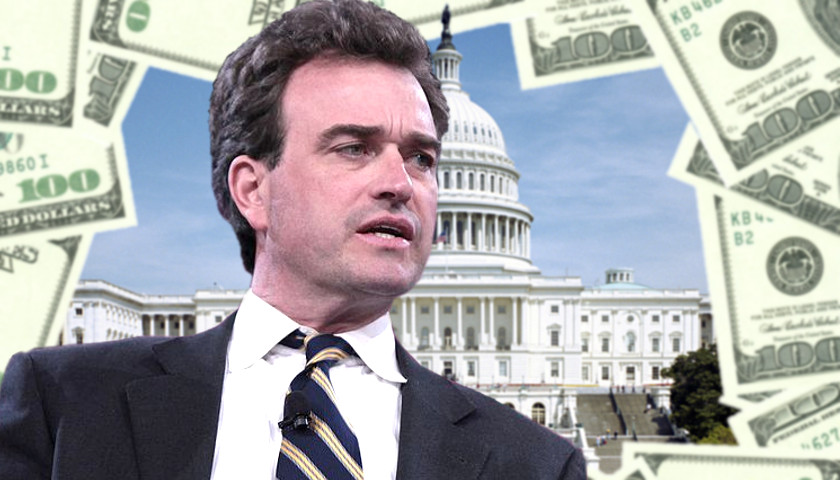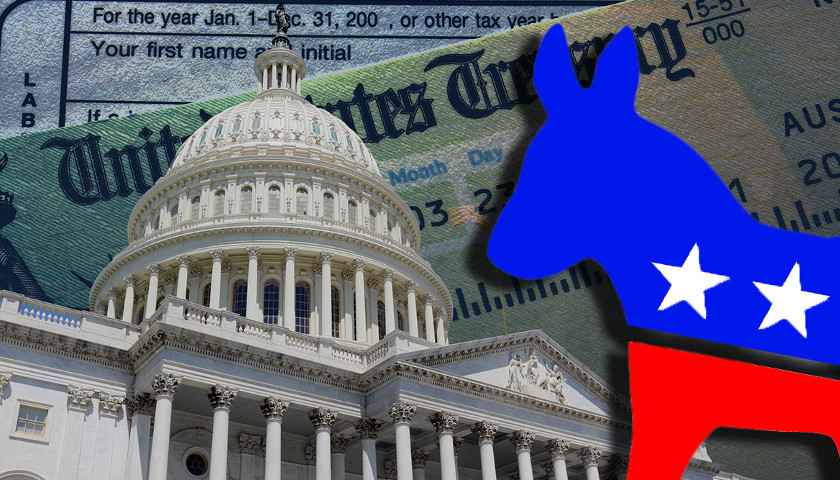Tuesday morning on The John Fredericks Show, host Fredericks welcomed Liberty University’s Business School Dean David Brat to the show to discuss the present and future of the United States economy.
Read the full storyTag: debt
Report: Consumers on Track for Record Year of Debt Repayment Before Coronavirus Hit
U.S. consumers were on track for a record year of debt repayment before the coronavirus shutdown, according to a new 2020 Credit Card Debt Study published by the personal-finance website WalletHub.
Consumers entered 2020 owing more than $1 trillion in credit card debt after a $76.7 billion net increase during 2019. By the end of March, however, they posted the largest first-quarter credit card debt paydown – $60 billion – since at least 1986.
Read the full storyPew Report: Expect Increase in Debt Collection Lawsuits, Debt Collectors Seizing Stimulus Checks
A new report published by Pew Charitable Trusts suggests that with the increase of debt collection lawsuits, “debt collectors may seize $1,200 coronavirus checks intended for household expenses.”
Before the coronavirus restrictions began, American household debt had already increased by $1.5 trillion between 2008 and 2019. As debt increased, so also did an aggressive approach made by creditors and third-party firms to use state civil courts to pursue collections through debt claims, Pew says.
Read the full storyNew American Populist Founder Jeff Webb Discusses His Recent Townhall Op-Ed ‘Giving the Financially Mismanaged States a Bailout is Morally Reprehensible’
Live from Memphis on the newsmakers line Thursday morning on The Tennessee Star Report with Michael Patrick Leahy – broadcast on Nashville’s Talk Radio 98.3 and 1510 WLAC weekdays from 5:00 a.m. to 8:00 a.m.– Leahy was joined by the New American Populist Founder Jeff Webb.
Read the full storySenator Marsha Blackburn Says China Should Waive Some of U.S. Debt After COVID-19 Outbreak
This week Sen. Marsha Blackburn (R-TN) said China should waive some of the United States’ $1.08 trillion debt for inflicting COVID-19 upon this country and other parts of the world.
Blackburn said this while appearing on The Jeff Poor Show out of Huntsville, Alabama.
“One of the things is my Senate resolution 553 which expresses the sense of the Senate that we know this came from Wuhan, China, and that they hid the information and were not transparent, that they blocked the World Health Organization and the CDC from coming in to help. They tried to blame it on the U.S. military. We hold them accountable, and I will tell you I think that we need to look at the fact that China owns over $1 trillion of our debt,” Blackburn said.
Read the full storyAnalysis: Federal Fiscal Shortfall Surges Past $100 Trillion
The U.S. Treasury has published a major report revealing that the federal government has amassed $103.7 trillion in debts, liabilities, and unfunded obligations.
Read the full storyReports: Consumers Still Carrying Debt From Last Holiday Season, Expected to Spend $1.1 Trillion This Holiday Season
About 35 million Americans still have holiday credit card debt leftover from last year, according to WalletHub’s 2019 Holiday Shopping Survey.
Read the full storyCommentary: Deficits Are Secondary to What You’re Paying For
“I am not worried about the deficit,” Ronald Reagan famously said. “It is big enough to take care of itself.”
If you pay attention to the libertarian purists, President Reagan earns mixed reviews on his economic policies. After all, in 1983, the federal budget deficit exceeded 6 percent of GDP. But Reagan was untroubled by federal budget deficits for at least two reasons, and in both cases he has been vindicated by history.
Read the full storyCommentary: Each American Is $240,000 in Debt Because of Excessive Government Spending
As Americans, we are greatly indebted not only to the men and women who have fought and died for our country, but also to the thinkers, statesmen, innovators, and ordinary people who gave us our founding principles.
Read the full storyOhio Bill Allowing Students to Transfer Credits Unanimously Passes in the State House
by Todd DeFeo A bill aimed at allowing students to transfer general education course credits from one public university in Ohio to another could bring with it potentially higher costs for schools, according to a fiscal analysis of the bill. The state House unanimously passed House Bill 9, which lawmakers hope allows more students to graduate in four years and reduces student debt. The bipartisan legislation would require institutions to notify students if they are eligible for an associates’ degree. It would also allow students to pay in advance for required classes, but that are either at capacity or unavailable – allowing the student to take the course at a later date. “HB 9 is going to be a great asset in our continual drive to restore Ohio’s promise as an opportunity state for students and employers alike,” state Rep. Bride Rose Sweeney, D-Cleveland, said in a statement. “We owe it to Ohio’s future – our students – to keep our promise to make college more affordable so that every student who works hard has the opportunity to get ahead by graduating on time and without a mountain of student debt,” Sweeney added. “HB 9 makes it easier for every…
Read the full storyFederal Report Says Millennials Are Poorer Than Other Generations
by Ryan McMaken One of the challenges in looking at income and wealth data is getting a sense of how different demographic groups are affected. It’s relatively easy to find median income and wealth data over time for the entire population, for example. But then problems of interpretation immediately present themselves. For example, if the data is household data, what are we to make of things if the household compositions has changed over time? And what if the demographics of the individuals within the households themselves have changed? For example, if a larger proportion of all households are now younger households, perhaps that could have an effect on the income and wealth data overall. After all, younger heads of household tend to have lower incomes and less wealth than older heads of households. This problem of measuring workers and incomes over time has been the challenge that presents itself to anyone trying to figure out if so-called millennials are richer or poorer — as a group — than other age cohorts. To do this, researches must find some way to estimate wealth and incomes for different age cohorts at similar ages or at similar points in their careers. Otherwise,…
Read the full storyDeceptive Tricks Congress Uses to Drive Spending Higher
by Justin Bogie Congress is up to its old tricks again, trying to pass another massive spending bill that uses gimmicks and tricks to push deficit spending even higher. And it thinks it can hoodwink President Donald Trump into signing it. Next week, the House is expected to vote on a combined fiscal year 2018 continuing resolution and a fiscal year 2019 spending bill for the departments of Defense, Labor, and Health and Human Services. The “cromnibus” bill would provide over $855 billion in funding for 2019, making up two-thirds of the total discretionary budget. The Senate passed the measure on Tuesday. If the House passes the Senate version and the president signs it into law, the government will stay open past Sept. 30. But at what cost? Earlier this year, Congress busted the budget and with a whopping spending deal that ran up nearly $300 billion in new debt. This bill would continue those spending levels. Take the so-called savings from changes in mandatory programs. The bill claims nearly $8 billion in savings from such changes. This is the most commonly used gimmick to increase discretionary spending. These “savings” are included in appropriations bills as a rescission of funds, meaning that unspent money…
Read the full storyStudent Debt in the United States Tops $1.4 Trillion
by Andrew Kerr Students continue to struggle mightily to repay their student debt amid a booming economy, according to a report released Tuesday by the New York Fed. Outstanding student loan debt stood at $1.41 trillion at the end of June, making it the second largest category of household debt behind mortgages. Americans collectively hold more student debt than they hold in credit card and auto loan debts, according to the report. More concerning is the troubling rate at which student loan borrowers are entering default. Nearly 11 percent of all student debt was either 90 days delinquent or in default at the end of June, making it the 24th consecutive quarter the New York Fed has recorded a student loan delinquency rate above 10 percent. Mortgage default rates, in comparison, have dropped dramatically since the subprime mortgage crisis that contributed heavily to the 2008 recession. At its peak, 8.9 percent of all outstanding mortgages were in delinquency in the first quarter of 2010 and steadily dropped down to the 1.1 percent delinquency rate as of the end of June. Students’ struggles to pay off their student loans can be attributed in part to the fact that the federal government does…
Read the full storyCommentary: Trump, Reagan, and Big Government
by Jeffery Rendall As I strolled through the excellent and memory-provoking exhibits at the Ronald Reagan Presidential Library (in Simi Valley, CA) the other day I was struck by how similar President Donald Trump’s approach to today’s politics is to the way Ronald Reagan handled the subject a half century ago. For starters, Reagan and Trump’s optimistic pro-American emphasis is nearly identical. They both appealed to the patriotic propensities of country-loving individuals to rise up and be the best they possibly can be, so that everyone might achieve their goals and dreams as long as they’re willing to work hard, sacrifice and put stock in the best nation on the planet. At their core both Reagan and Trump mastered a populist message and used it to ignite a movement (unfortunately in their cases, very personality-centered). Both acknowledged America as the lead source of good in the world and championed American exceptionalism as their signature value. Both were extremely media savvy and understood mass communications and messaging to perfection. It almost appears as though Trump’s emulated Reagan’s political career and added his own personal touches to match the legendary effectiveness of the great communicator. Reagan didn’t have Twitter, of course, and…
Read the full storyCommentary: The Ticking Fiscal Time Bomb Set in 1937 Could Tip America Into Despotism by 2030
by Robert Osburn Celebrated this past July 4, America’s founding story of freedom is truly remarkable: unity, courage, integrity, and national integration (incorporating people from around the world). In most other places, the freedom story is bloody, exclusive, and, ultimately, tyrannical. Take Nicaragua, for one example: In 1979, the Sandinistas overthrew dictator Anastasio Somoza. Nearly four decades later, hundreds are dying because the very people who led the Sandinista revolution (Daniel Ortega and friends, now in power) are behaving exactly like Somoza. It’s déjà vu all over again for our Central American neighbors. In an age when democracy is clearly retreating, will America eventually succumb to autocracy while waving sayonara to democracy? It’s a question that National Review’s JonahGoldberg once very handily dismissed. He now admits that American totalitarianism is a real possibility. Utilizing a scenario-building skill that I learned during my doctoral studies, let me offer what I consider a very plausible scenario that takes America down the rathole of tyranny: Sometime between 2028 and 2034, America’s president will use executive or emergency powers to solve the nation’s Social Security trust fund crisis. As Americans celebrate that presidential act of courage, we will begin the long road to tyranny because we cannot rule ourselves. Does this remind anyone of the books of Judges and I Samuel when, because everyone did what was right…
Read the full storyMetro Nashville Faces Reality of Heavy Borrowing in $34 Million Revenue Shortfall
Surprise! Nashville is growing skyscrapers and other developments at an ever-increasing rate yet faces a $34 million revenue shortfall. Councilman-at-large John Cooper, who is on Metro’s Budget and Finance Committee says Nashville’s revenue continues to grow faster than most cities, to the tune of a couple billion dollars, NewsChannel 5 reports. At the same time, Metro can’t fully fund schools or provide promised pay raises to employees, and some are calling for a property tax hike. Nashville has been glutted with massive capital projects despite some narrow misses. Most of the new money has gone to debt service to pay for pretty and shiny projects like the Sounds baseball stadium and the convention center, plus more conventional needs like school improvements. Borrowing costs have increased about $100 million in the last five years. Former Mayor Megan Barry’s resignation earlier this year following a sex and ethics scandal was followed by the failure of the $9 billion transit plan, the Nashville Scene reports. Then there was Barry’s quickly abandoned plan to end inpatient care at Metro General Hospital, the same week that the Metro Council approved a $275 million soccer stadium plan; the proposed Cloud Hill development, a sweetheart deal for…
Read the full storySome on Right Worry Trump’s Infrastructure Plan Is a Boondoggle in the Making
President Donald Trump unveiled his plan Monday to fix what the White House describes as the “unacceptable state of disrepair” of the nation’s roads and bridges, but some experts warn it could turn into a costly and unneeded boondoggle to fix a problem that doesn’t really exist.
Read the full storyCommentary: Swamp Creatures Stir to Life as Big Spending Sparks Bipartisanship
Any time you hear Washington talk about bipartisan agreement, America, grab your wallet and run! Once again, lawmakers in Washington have finally cut through all the thorny brambles of partisanship and discovered (yet again! yippie!) something they can all agree upon: spending scads and scads more of other people’s money that we don’t even have!
Read the full storyBudget Hawks During Tax Debate, Democrats Now Silent on Deficits
Democrats who howled about the debt during last year’s debate over tax cuts have stood silent over a comparably large increase in red ink projected from a budget-busting spending plan that cleared Congress and was signed by President Donald Trump early Friday.
Read the full storyHouse Joins Senate, Passes Massive Budget to End Government Shutdown
The House of Representatives passed a massive $400 billion budget agreement early Friday intended to end a partial federal government shutdown. The lawmakers voted 240-186 to approve the accord that now goes to President Donald Trump for his signature. However, it only funds the government through March 23.
Read the full story


















